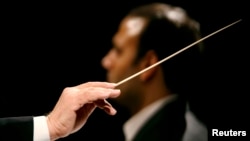When the curtain rises on Giuseppe Verdi's "La Battaglia di Legnano" ("The Battle of Legnano") in Sarasota, Florida., later this month, it will cap an achievement as historic in its way as the military victory the opera celebrates.
Under the leadership — and baton — of artistic director Victor DeRenzi, the Sarasota Opera will have put on fully staged productions of every opera written by the prolific Italian composer, including the many revisions he made over his lifespan of 87 years.
And DeRenzi is not content with just entire operas. He also has led performances of virtually every note of music Verdi composed, from choral pieces, songs and sacred works, down to brief, eight-measure piano pieces, plus many individual arias and duets written for particular works and later discarded.
"To my knowledge, no other company in Europe or America has done what Victor has done in Sarasota," said the eminent musicologist Philip Gossett.
A remarkable accomplishment, to be sure, but why Sarasota — and why Verdi?
The Sarasota answer is simply that this Gulf Coast city of more than 50,000 year-round residents — swelled each winter by well-heeled northerners fleeing the cold — supports a thriving arts community, including opera, orchestra, ballet, theater and art museum.
As for the Verdi, put it down to DeRenzi's lifelong fascination with a composer whose depth and variety of work he considers unrivaled and whose mature masterpieces build on the experience gained writing his early, less accomplished works. Today his most popular operas, such as "Rigoletto," ''La Traviata" and "Aida," with their stirring melodies and dramatic intensity, are staples of the repertory.
"What makes Verdi great?" DeRenzi said in a recent telephone interview. "He started off as kind of a really talented kid down the street. Today, he'd be at the computer making software.
"But then he developed into this towering genius," he added. "He constantly renewed himself, changed."
It's the chance to have his audiences experience the full range of this genius that excited DeRenzi as he put together the series over the years. He recalled the enthusiastic reception of a lesser-known work, "Aroldo," in 1990 as a pivotal moment.
"The audience would not stop applauding," he said, "and that just led me forward to think, well if there is that much gold to be mined in an opera like 'Aroldo,' maybe the others can have the same effect. . Over the years my audience has built this knowledge of Verdi and his times. It's created this encyclopedia for them."
Exactly how many volumes should be counted in that encyclopedia is open to debate because, as Gossett put it, Verdi was "an inveterate reviser of his works."
Many sources put Verdi's output at 27 or 28 operas, starting with "Oberto" in 1839 and ending with "Falstaff" in 1893. Vincent La Selva and his New York Grand Opera got into the Guinness Book of Records by performing 28 operas in chronological order from 1994-2001 in Central Park.
But DeRenzi counts major revisions as separate works and comes up with a figure of 33.
"Aroldo," for example, was a rethinking of the earlier "Stiffelio." ''I Lombardi" later resurfaced in a French version as "Jerusalem." And for "Don Carlos," there's a four-act and a five-act version (as well as librettos in both French and in Italian).
Whatever the total, the final two pieces fall into place this season: "Aida," which opened Jan. 30., and "La Battaglia," premiering on Feb. 27. The latter, rarely performed, is a rousing work written to whip up nationalist fervor by depicting the 12th century victory of Italian forces over the Holy Roman Empire.
The season will conclude on March 20 with a gala concert of shorter pieces, including, DeRenzi said, "a duet from 'Oberto' that hasn't been performed since the 1840s."
As for next year, it will be his first in more than a quarter-century with no Verdi. That is, unless some scholar should come across a lost treasure in a library or museum.
"There is an aria we know was written for 'Giovanna d'Arco' ('Joan of Arc') that people have looked all over for, and it doesn't exist," DeRenzi said. "But of course if it shows up some day."
Sarasota Opera Caps Unique Verdi Project

NEW YORK —



